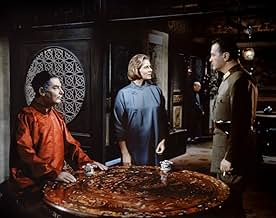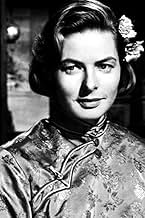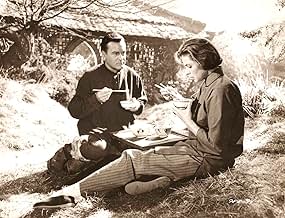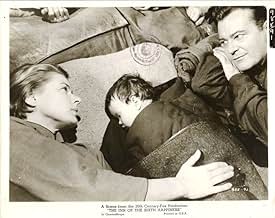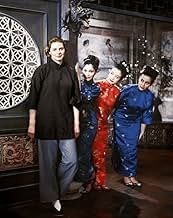NOTE IMDb
7,2/10
5,6 k
MA NOTE
Une femme britannique tenace devient missionnaire et dirige une auberge pour les marchands ambulants en Chine pendant l'invasion japonaise et les années tumultueuses qui précèdent la Seconde... Tout lireUne femme britannique tenace devient missionnaire et dirige une auberge pour les marchands ambulants en Chine pendant l'invasion japonaise et les années tumultueuses qui précèdent la Seconde Guerre mondiale.Une femme britannique tenace devient missionnaire et dirige une auberge pour les marchands ambulants en Chine pendant l'invasion japonaise et les années tumultueuses qui précèdent la Seconde Guerre mondiale.
- Réalisation
- Scénario
- Casting principal
- Nommé pour 1 Oscar
- 3 victoires et 7 nominations au total
Curd Jürgens
- Capt. Lin Nan
- (as Curt Jurgens)
Noel Hood
- Miss Thompson
- (as Noël Hood)
Chris Adcock
- Russian Soldier
- (non crédité)
Frank Blaine
- Madman
- (non crédité)
Alexis Bobrinskoy
- Russian Fireman
- (non crédité)
Avis à la une
10rcs8
I show this film in my classes on leadership. Though some may find it "corny" or condescending, it is a fine and "human" portrayal of how stubbornness, faith, and a sense of justice can lead one toward great acts of courage. It's also simply an extremely interesting story. I understand that the real Gladys Aylward, on whose life the film is based, was embarrassed by the fictional "love story" portion of the film. I'm not sure why I read so many negative reactions to the film. The depictions of how Aylward inspires those around her are timeless. The three main actors, Ingrid Bergman, Robert Donat, and Kurt Jurgens, put in excellent and nuanced performances. Ms. Bergman is at her most beautiful in this film, conveying so much meaning simply with a glance. My Chinese students tend to like the film very much. Perhaps the finest scene occurs when Jen Ai (Aylward's Chinese name in the film) goes to the village to persuade the mothers to unbind their daughters' feet. So many of my students didn't even know about this cruel practice.
This is a story of a real English woman (Gladys Aylward) who gave her life for the Chinese people as a missionary with surprisingly strong will.
She visited the office of China Inland Mission Center in London only to be refused. On her way to the introduced employer for a housemaid, she stopped by a travel agent and booked a train to China via Siberia. In this way, she always does what she believes she ought to do, upon belief of that God protects and leads her. She shows her sanguine attitude and tireless energy which are typical to God believers. One may doubt if such a woman actually exists, but I remember similar woman. I read an autobiography ("Chasing the Dragon" by Jackie Pulllinger) of another English woman who served as a missionary at the Walled City of Hong Kong. From the memory of my surprise from the book, I could believe that Cladys Aylward actually existed.
I think Ingrid Bergman acted this woman very well. However, this movie has many embroideries and dramatizations that are typical to 1950s Hollywood movies. For example, English language dominates the movie in China, and the scene the children are welcomed amid hearty cheers of people of Sian. The most questioned embroidery is that the colonel is given Caucasian blood and made to the lover of Cladys.
She visited the office of China Inland Mission Center in London only to be refused. On her way to the introduced employer for a housemaid, she stopped by a travel agent and booked a train to China via Siberia. In this way, she always does what she believes she ought to do, upon belief of that God protects and leads her. She shows her sanguine attitude and tireless energy which are typical to God believers. One may doubt if such a woman actually exists, but I remember similar woman. I read an autobiography ("Chasing the Dragon" by Jackie Pulllinger) of another English woman who served as a missionary at the Walled City of Hong Kong. From the memory of my surprise from the book, I could believe that Cladys Aylward actually existed.
I think Ingrid Bergman acted this woman very well. However, this movie has many embroideries and dramatizations that are typical to 1950s Hollywood movies. For example, English language dominates the movie in China, and the scene the children are welcomed amid hearty cheers of people of Sian. The most questioned embroidery is that the colonel is given Caucasian blood and made to the lover of Cladys.
Once more, in this film as she had in her earlier films, Ingrid Bergman proves she was "A PERFECT ACTRESS!" In this film, "Inn of the Sixth Happiness," she plays Englishwoman Gladys Aylward who knew that China was the place where she belonged. Not qualified to be sent there as a missionary she worked and saved her money until she had enough to go on her own. Once there, she meets up with people who manage to help her through her first days. Then, she is nearly all alone and must make it or leave China. She stays. Eventually, just as WW2 is breaking out, she rescues over 100 children and takes them to freedom.
Again, I repeat, it clearly shows Ingrid Bergman as a perfect actress. She shows her talent and charm all through this film and it is one everyone in the family can watch and appreciate. I highly recommend it.
Again, I repeat, it clearly shows Ingrid Bergman as a perfect actress. She shows her talent and charm all through this film and it is one everyone in the family can watch and appreciate. I highly recommend it.
A lot has been said, both positive and negative, about the main Asian roles played by Caucasian actors in this film. As an Asian of Chinese descent myself, I've learnt not to get too bent up over this, especially when one considers when this movie was made.
I just recently got the DVD and watched it for the second time after a gap of more than 20 years and I still see the magic of the movie and why it remains inspiring. There are, of course, quite a few creative licenses taken at the expense of the actual life of Gladys Aylward (which IMHO is actually much more inspiring) but that is to be expected with cinema.
What surprised me even more was that Robert Donat who played the Mandarin (the literal translation of his title in the movie would be County Governor; ie. Hsien Chang or 縣長) actually spoke better Mandarin than Peter Chong who played Yang the cook who I assume isn't a native Mandarin speaker.
All in all, I thoroughly enjoyed it and felt the same awe and emotions as when I first saw it as a young boy.
I just recently got the DVD and watched it for the second time after a gap of more than 20 years and I still see the magic of the movie and why it remains inspiring. There are, of course, quite a few creative licenses taken at the expense of the actual life of Gladys Aylward (which IMHO is actually much more inspiring) but that is to be expected with cinema.
What surprised me even more was that Robert Donat who played the Mandarin (the literal translation of his title in the movie would be County Governor; ie. Hsien Chang or 縣長) actually spoke better Mandarin than Peter Chong who played Yang the cook who I assume isn't a native Mandarin speaker.
All in all, I thoroughly enjoyed it and felt the same awe and emotions as when I first saw it as a young boy.
This film concerns the life and achievements of one Gladys Aylward, a Christian woman from Great Britain who conceived early on that her place in the world was in China. She was a remarkable person who let absolutely nothing deter her in her calling. That included a lack of formal education, no support at all from any accredited missionary group and no money of her own. She worked as a maid to get the money to get a one way ticket to China with only an address of an aged female missionary who needed a young assistant.
This film marked Ingrid Bergman's complete return to our fickle public's favor. After the scandal of her affair with Roberto Rosellini and her divorce, the public would not accept her in saintly roles like Joan of Arc and The Bells of St. Mary's. But winning her second Oscar two years earlier cemented her comeback from Europe and this part restored her in our fickle public's affections. We'd never get away with casting her as an Englishwoman today, but she overcomes any accent problems with unbridled talent.
She soon inherits the whole mission when Athene Sayler dies. And she supports it by working as a foot inspector for the local mandarin. In those days of the twenties among other things the Kuomintang government was trying to do was undo the Chinese custom of footbinding females at a young age so they would have petite feet. It met with a lot of local resistance, but she proves up to the task.
The title of the film comes from the idea that Athene Sayler had. Not to open up a formal church as such. Instead she wanted to open an inn in which travelers could stop and hear stories for entertainment. No television in those rooms. The stories they heard were those of the Bible. It was Sayler, Bergman, and their cook Peter Chong who ran the place and soon it was Bergman and Chong.
If Bergman's casting seems bizarre by today's standards, the casting of Curt Jurgens as a Chinese Kuomintang Army Colonel is worse. Jurgens's occidental features are written into the script making him bi-racial, Dutch father and Chinese mother. He's a man with little convictions about spiritual matters, except he comes to believe in Bergman, in her innate decency, her dedication to his people, and what she's trying to accomplish.
The mandarin is even more bizarrely cast. The part calls for an asthetic actor so they got the best around in Robert Donat. This was Mr. Donat's farewell performance, he died while the film was still in theaters. No one would get away with that casting today, but Robert Donat is also that good a player.
I'm sure if the film were remade today, we'd have real oriental players like Russell Wong for the Colonel and James Shigeta for the mandarin and maybe someone like Kate Winslet for Gladys Aylward. But would it be as good as this film?
The subject of missionaries and the good they do is one hotly debated topic. It does take a certain amount of brass to go to a given place and tell everyone your belief system is all wrong.
I suppose the best way to lead is by example and Ingrid Bergman as Gladys Aylward set the best example she could. In fact she did one thing most missionaries, good or bad, wouldn't consider. She gave up her British citizenship and became a Chinese citizen.
The film was helped a great deal by the inclusion of that children's song This Old Man where Ingrid tries to teach her youngest charges some English with it. It was enormously popular back in the day and Mitch Miller's record of it was heard constantly.
The climax of the film and what gave Gladys Aylward her place in history is that trek with a hundred orphans away from the advancing Japanese army. A remarkable achievement indeed from a remarkable dedicated woman who wouldn't listen to anything, but what was inside her soul.
This film marked Ingrid Bergman's complete return to our fickle public's favor. After the scandal of her affair with Roberto Rosellini and her divorce, the public would not accept her in saintly roles like Joan of Arc and The Bells of St. Mary's. But winning her second Oscar two years earlier cemented her comeback from Europe and this part restored her in our fickle public's affections. We'd never get away with casting her as an Englishwoman today, but she overcomes any accent problems with unbridled talent.
She soon inherits the whole mission when Athene Sayler dies. And she supports it by working as a foot inspector for the local mandarin. In those days of the twenties among other things the Kuomintang government was trying to do was undo the Chinese custom of footbinding females at a young age so they would have petite feet. It met with a lot of local resistance, but she proves up to the task.
The title of the film comes from the idea that Athene Sayler had. Not to open up a formal church as such. Instead she wanted to open an inn in which travelers could stop and hear stories for entertainment. No television in those rooms. The stories they heard were those of the Bible. It was Sayler, Bergman, and their cook Peter Chong who ran the place and soon it was Bergman and Chong.
If Bergman's casting seems bizarre by today's standards, the casting of Curt Jurgens as a Chinese Kuomintang Army Colonel is worse. Jurgens's occidental features are written into the script making him bi-racial, Dutch father and Chinese mother. He's a man with little convictions about spiritual matters, except he comes to believe in Bergman, in her innate decency, her dedication to his people, and what she's trying to accomplish.
The mandarin is even more bizarrely cast. The part calls for an asthetic actor so they got the best around in Robert Donat. This was Mr. Donat's farewell performance, he died while the film was still in theaters. No one would get away with that casting today, but Robert Donat is also that good a player.
I'm sure if the film were remade today, we'd have real oriental players like Russell Wong for the Colonel and James Shigeta for the mandarin and maybe someone like Kate Winslet for Gladys Aylward. But would it be as good as this film?
The subject of missionaries and the good they do is one hotly debated topic. It does take a certain amount of brass to go to a given place and tell everyone your belief system is all wrong.
I suppose the best way to lead is by example and Ingrid Bergman as Gladys Aylward set the best example she could. In fact she did one thing most missionaries, good or bad, wouldn't consider. She gave up her British citizenship and became a Chinese citizen.
The film was helped a great deal by the inclusion of that children's song This Old Man where Ingrid tries to teach her youngest charges some English with it. It was enormously popular back in the day and Mitch Miller's record of it was heard constantly.
The climax of the film and what gave Gladys Aylward her place in history is that trek with a hundred orphans away from the advancing Japanese army. A remarkable achievement indeed from a remarkable dedicated woman who wouldn't listen to anything, but what was inside her soul.
Le saviez-vous
- AnecdotesThis is the final film of Robert Donat, who died during its making. In the scene in which he is saying goodbye to Gladys as the elders prepare to take their leave of the city, he says, as though he was prophesying his death, "I fear we shall never see each other again."
- GaffesThe captain is talking with Gladys and says that someone will listen to anything for an extra bowl of rice. The story takes place in northern China and rice is only eaten in southern China. Noodles made from wheat was the mainstay of the Chinese diet in the north. Later in the film it appears Gladys takes a serving of rice from a large pot, and lastly on the journey with the children they come across some uncooked rice which Gladys picks it up.
- Citations
[Robert Donat's final line in his final film]
The Mandarin: We shall not see each other again, I think. Farewell, Jen-Ai.
- Crédits fousThe opening title card reads: "This story is based upon the life of Gladys Aylward, a woman of our time, who was, and is dedicated to the simple, joyful and rare belief that we are all responsible for each other."
- ConnexionsFeatured in Ingrid (1984)
- Bandes originalesTHE CHILDREN'S MARCHING SONG (THIS OLD MAN)
Traditional (Arranged by Malcolm Arnold)
Sung by Ingrid Bergman and a children's chorus
Meilleurs choix
Connectez-vous pour évaluer et suivre la liste de favoris afin de recevoir des recommandations personnalisées
- How long is The Inn of the Sixth Happiness?Alimenté par Alexa
Détails
- Date de sortie
- Pays d’origine
- Langues
- Aussi connu sous le nom de
- The Inn of the Sixth Happiness
- Lieux de tournage
- Société de production
- Voir plus de crédits d'entreprise sur IMDbPro
- Durée2 heures 38 minutes
- Couleur
- Rapport de forme
- 2.35 : 1
Contribuer à cette page
Suggérer une modification ou ajouter du contenu manquant

Lacune principale
By what name was L'auberge du sixième bonheur (1958) officially released in India in English?
Répondre



